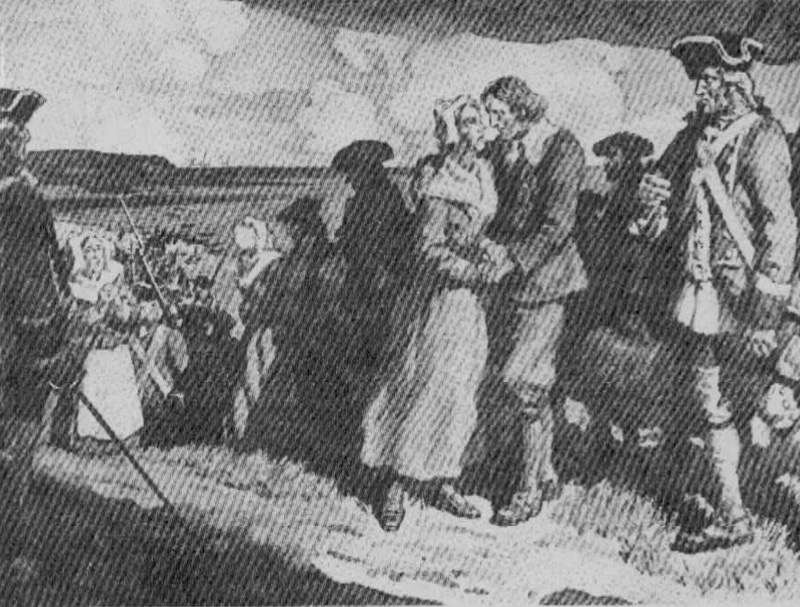
HISTORICAL EVENTS THAT TOOK PLACE ON THIS DAY IN CANADA
11 February

Embarkation of the Acadians, 1755
British Forces Destroyed
This is the forest primeval; but where are
the hearts that beneath it
Leaped like the roe, when he hears in the
woodland the voice of the huntsman?
Where is the thatch-roofed village, the
home of Acadian farmers,—
Men whose lives glided on like rivers that
water the woodlands,
Darkened by shadows of earth, but reflect-
ing an image of heaven?
—H. W. LONGFELLOW, Evangeline, 1847
The American poet, Longfellow, wrote the poem Evangeline about the expulsion of the Acadians from Nova Scotia in 1755. It aroused great sympathy for them for many years, but modern historians, adding up the score, contend that they deserved their fate.
France controlled Cape Breton because Britain had traded the fortress of Louisburg to France for Madras, India, in an amazing deal in 1748. The French were also installed in the Isthmus of Chignecto where Amherst and Sackville now stand, for troops had been sent from Quebec.
Between Cape Breton and what is now the boundary of New Brunswick, the British were trying to establish a colony that included more than 6,000 Acadians, descendants of the days when Champlain established Port Royal.
It was a highly dangerous situation because if France attempted to regain Nova Scotia, it was likely that the Acadians would side with the invading forces and bring the Indians with them. Many efforts were made to have the Acadians take an oath of allegiance to Britain, but they failed.
One of the incidents that led to the expulsion of the Acadians from Nova Scotia took place on February 11, 1747. A British force of 470 men from New England had set up a base at Grand Pré, meaning "great meadow," where Prime Minister Sir Robert Borden was born in 1854. A French force under M. de Ramezay was based at Chignecto, having marched from Quebec. It comprised about 1,600 men including the Indians who had joined along the way.
Acadians told de Ramezay about the weakness of the British position at Grand Pré, and urged him to attack. The march was made on snowshoes, with the Acadians acting as guides, and the assault on Grand Pré took place in a blinding snowstorm. The British force was wiped out. From then on it was felt that the Acadians could not be trusted and their expulsion took place eight years later.
OTHER NOTABLE EVENTS ON THIS DAY IN CANADIAN HISTORY
11 February
-1813 104th Regiment of New Brunswick, 1,000 strong, began a march to Quebec and did not lose a man.
-1839 Lord Durham's report was submitted to Parliament.
-1869 James Patrick Whelan was hanged in Ottawa for the murder of D'Arcy McGee; it was the last public execution in Canada.
-1887 C.P.R. arranged the Pacific Ocean freight and passenger service to the Orient.
-1907 The Supreme Court of Alberta was established.
-1922 The discovery of insulin was announced in Toronto.
-1940 Governor-General Lord Tweedsmuir died in Montreal.